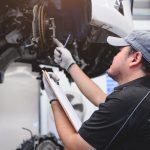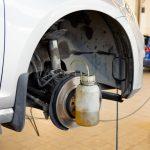
Solving Brake Noise Problems: Tips and Tricks for a Quieter Ride
- Harbor Brakes
- December 8, 2023
- Brakes
- brake, brake caliper, brake disc, brake fluid, brake flush, brake maintenance, brake pads, brake repair, brake rotors, brake service, pads, rotors
Brake noise can be an annoying and concerning issue for many drivers. The screeching or grinding sound can ruin your driving experience and raise safety concerns. But fret not, there are solutions to tackle this problem and enjoy a quieter ride. In this section, we will explore what causes brake noise, troubleshoot the issue, and provide effective tips for prevention and repair. Whether you’re dealing with squealing brakes or seeking ways to eliminate annoying brake noise, we’ve got you covered!
Key Takeaways:
- Brake Noise Solutions: Discover effective methods to address and resolve brake noise problems.
- Brake Noise Reduction: Learn how to reduce the noise level in your car’s braking system.
- Brake Noise Troubleshooting: Understand the potential causes of brake noise and how to diagnose them.
- Brake Noise Prevention: Follow best practices to prevent brake noise issues from occurring.
- Brake Noise Repair: Find out the steps to repair and eliminate brake noise in your vehicle.
Understanding Brake Noise and its Causes
Brake noise is a common issue that many drivers experience, and it can be quite bothersome. To effectively address and prevent brake noise problems, it is important to understand what causes them. Brake noise is primarily the result of vibration in the braking components, which then creates noise. This vibration can be attributed to various factors.
The causes of brake noise include corrosion, seized or bent location pins, partially seized calipers, built-up dirt and brake dust, excessive runout, disc thickness variation, and worn brake discs. These factors can contribute to the vibration of the brake components, leading to noise. Additionally, the motion created during braking can also cause movement in other parts of the vehicle, such as steering components and motor and transmission mounts, further contributing to brake noise.
By recognizing these causes, you can take the necessary steps to prevent and address brake noise issues effectively. Regular maintenance, including cleaning and inspecting brake components, can help identify and address any potential causes of brake noise. Let’s explore different types of brake noise in the next section.
Different Types of Brake Noise

When it comes to brake noise, there are various types that can occur, each characterized by a different frequency of vibration. Understanding these different types can help you identify the specific issue with your brakes and take the necessary steps to address it.
Judder
Judder is a type of brake noise that is characterized by a low-frequency vibration. It can often be felt through the steering wheel when braking. Judder may be caused by uneven brake pad deposits or a distorted brake disc, and it can result in a pulsating sensation when you apply the brakes.
Squeal
Squeal is a medium-frequency brake noise that is high-pitched and can be quite loud. It typically occurs when the brake pads vibrate against the brake disc, creating a friction-induced sound. Squeal can be caused by a variety of factors, including worn brake pads, glazed brake disc surfaces, or improper brake pad installation.
Squeak
Squeak is a high-frequency brake noise that is often described as a sharp, metallic sound. It can occur during braking or when releasing the brakes. Squeak can be caused by a lack of lubrication between the brake pad backing plate and the caliper, worn brake pad indicators, or a buildup of debris and rust on the brake components.
Ultrasound
Ultrasound is a very high-frequency brake noise that is often beyond the range of human hearing. It can be detected by specialized equipment and is usually indicative of issues with the brake pad material or the interaction between the brake pad and disc surface. Ultrasound noises should be addressed promptly to prevent further damage to the braking system.
Grinding and Scraping
Grinding and scraping noises are more severe types of brake noise that indicate metal-to-metal contact between the brake pads and discs. These noises usually occur when the brake pads are completely worn or when there is a foreign object lodged between the pads and discs. Grinding and scraping noises should be addressed immediately, as they can cause significant damage to the braking system.
By understanding the different types of brake noise and their potential causes, you can better diagnose and address any issues with your brakes. If you experience any of these brake noises, it is recommended to have your brakes inspected by a qualified technician to ensure the safety and reliability of your vehicle.
Best Practices for Brake Noise Prevention and Repair

When it comes to preventing and repairing brake noise, there are several best practices you can follow. By implementing these strategies, you can ensure a quieter and smoother ride for your vehicle. Here are some essential tips to keep in mind:
Maintain Brake Pad and Caliper
Regular maintenance of your brake pads and calipers is crucial in preventing brake noise. Inspect them periodically and replace worn-out brake pads promptly. Additionally, make sure the calipers are functioning properly and aren’t sticking or seizing. Proper lubrication can help prevent noise caused by friction.
Ensure Proper Pad Installation
Proper installation of brake pads is vital for noise prevention. Make sure the pads are positioned correctly and that all necessary hardware, such as shims and clips, are in place. Consult your vehicle’s manual or seek professional assistance to ensure proper installation.
Inspect the Brake System
Regularly inspect the entire brake system for any signs of wear, damage, or leaks. Check for any brake fluid leaks, as they can affect the performance and create noise. Additionally, inspect the pistons for any damage or sticking, and monitor the wear of the pads. Identifying and addressing issues early on can help prevent brake noise.
Use OE Quality Brake Pads
Choosing high-quality brake pads specifically designed for your vehicle, such as Original Equipment (OE) quality pads, can significantly reduce the chances of brake noise. These pads are engineered to meet the specifications of your vehicle and provide optimal performance and noise reduction. Avoid using low-quality or generic brake pads that may not fit or perform as well.
By following these best practices, you can minimize the risk of brake noise and ensure a smooth and quiet ride. Regular maintenance, proper installation, and the use of high-quality brake pads are key in preventing and repairing brake noise issues. Remember to consult a professional if you have any concerns or need assistance with brake system maintenance or repair.
| Best Practices for Brake Noise Prevention and Repair |
|---|
| Maintain Brake Pad and Caliper |
| Ensure Proper Pad Installation |
| Inspect the Brake System |
| Use OE Quality Brake Pads |
Conclusion
Brake noise can be a frustrating problem that affects both your comfort and peace of mind while driving. However, there are effective solutions available to help you enjoy a quieter and smoother ride.
By understanding the causes of brake noise and implementing best practices for maintenance and repair, you can prevent and troubleshoot this issue effectively. Regularly inspect your brake system and address any issues promptly to ensure optimal performance and reduce the chances of brake noise. Additionally, using high-quality brake pads specifically designed for your vehicle can significantly contribute to a quieter driving experience.
Remember, prevention is key. Taking proactive steps to prevent brake noise, such as keeping the brake system clean and free from dirt and debris, can go a long way in ensuring a quiet ride. By following these tips and solutions, you can minimize the chances of experiencing brake noise and enjoy a more enjoyable driving experience.
FAQ
What causes brake noise?
Brake noise can be caused by factors such as corrosion, bent location pins, partially seized calipers, built-up dirt and brake dust, excessive runout, disc thickness variation, or worn brake discs. Additionally, brake noise can also be created when braking motion creates movement in other parts of the vehicle.
What are the different types of brake noise?
The different types of brake noise include judder (low-frequency vibration), squeal (medium-frequency vibration), squeak (high-frequency vibration), ultrasound (very high-frequency vibration), grinding (metal-to-metal contact), and scraping (foreign body lodged between pad and disc).
How can I prevent brake noise?
To prevent brake noise, it is important to regularly maintain the brake pads and calipers, ensure proper installation and positioning of the pads, check for brake fluid leaks, inspect piston condition, monitor pad wear, keep the brake system clean from dirt and debris, and use OE quality brake pads.
Do I need to replace worn brake discs and pads to eliminate brake noise?
In some cases, replacing worn brake discs and pads may be necessary to eliminate brake noise issues.
How can I address brake noise promptly?
To address brake noise promptly, it is important to regularly inspect your brake system for any issues and address them as soon as possible.
Source Links
- https://www.delphiautoparts.com/en-gb/resource-center/article/listen-up!-top-tips-for-solving-brake-noise
- https://www.tirereview.com/brake-noise-quiet/
- https://www.bikeradar.com/advice/workshop/how-to-silence-disc-brakes/

